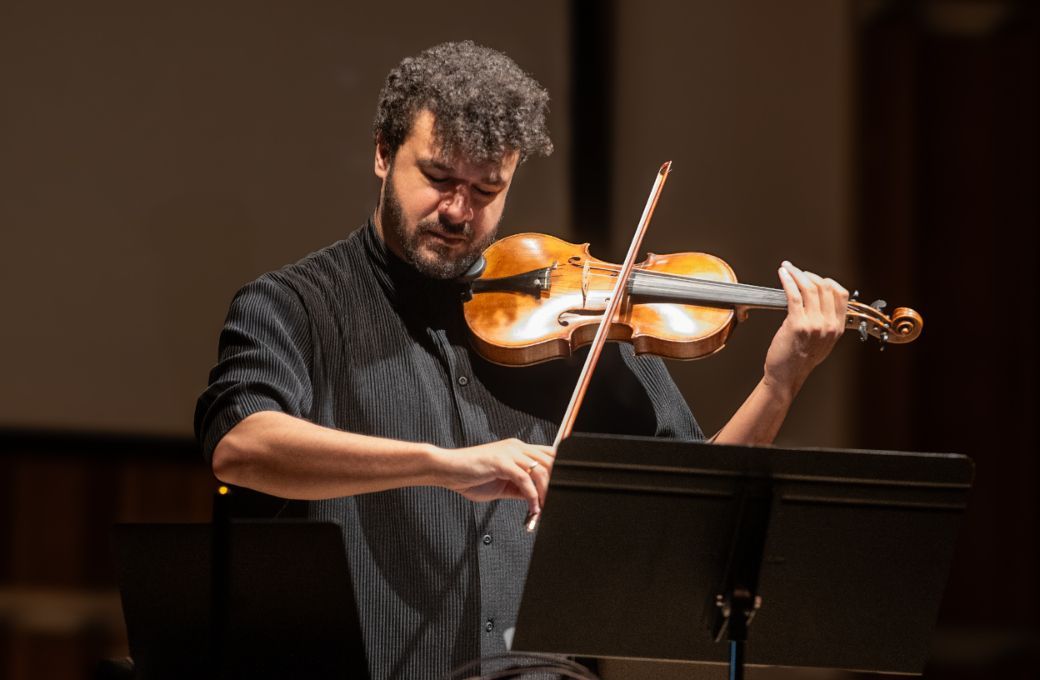Curtis Stewart has become something of a force in New York City in recent years, not just for his virtuosic musicianship but as a voice for diversity in classical music and recognition of past contributions by Black composers. The still-under-40 Grammy-nominated violinist is a professor at The Juilliard School, artistic director of the American Composers Orchestra and a member of PUBLIQuartet, a string quartet dedicated to making contemporary music inclusive and accessible. As the offspring of prominent jazz tubist Bob Stewart and violinist Elektra Kurtis, founder of the classical/jazz/ethnic-fusing Ensemble Elektra, he has training and pedigree on which to build.

It’s only in the last few years that Stewart has tried his hand at composing, beginning with his 24 American Caprices, four of which received their New York City premieres at Merkin Hall at Kaufman Music Center on Friday. It was the last concert in Stewart’s residency and the first in Gateway Music Festival’s weekend of New York City events. The not-yet-complete book of 24 solos includes pieces inspired by the work of John Coltrane, Joni Mitchell and Sister Rosetta Tharpe and, for this night, David Bowie, Oscar Peterson and Stevie Wonder, as well as James Weldon Johnson’s Lift Every Voice and Sing, commonly known as ‘the Black national anthem’.
The focus in the Bowie (Modern Love) and Peterson (Hymn to Freedom) selections was at least as much about the sources’ rhythms as they were about melody. Stewart’s violin, though, appropriately sang through Lift Every Voice and his reworking of Stevie Wonder’s Isn’t She Lovely dripped quite nicely with sentiment. The four pieces were fleeting and brief, and it sometimes felt as if Stewart’s proficiency got in the way. They were scattered and stormy, perhaps true to the inspiration he found in Paganini, but as portraits came off as barely sketched.
Stewart’s portraiture isn’t limited to popular realms. He has recomposed Dvořák and Schubert and, for the better part of this concert, presented a bold reworking of The Four Seasons. His Seasons of Change for string orchestra with electronics and video projection is a meditation on the intersection climate and class. Woven through the work is spoken commentary (duplicated onscreen) from interviews with climate scientists and unhoused individuals conducted by Stewart for the project.
Vivaldi’s four concertos, with Stewart as soloist, were transformed into a call to action. The orchestration of familiar strains was admirably done, with heroic swells and subtle dissonances and sudden outbursts, including an abrupt, clapped rhythm suggestive of a folk dance. Like the caprices, the seasons were busy, seemingly concerned with getting all of the ideas out as fast as possible, ideas which sometimes could have been better served with more development (and more time to hear them). The strongest moments were in the musical quotations, looped and fractured, repeating the source and emphasizing the drama, especially in the Fallback (Vivaldi’s Autumn) movement.
As a new composer, just a few years into the practice, Stewart has taken on a lot in assuming such known voices of the 1960s, 70s and 80s, not to mention the 1720s. He’s got the chops, both as orchestrator and instrumentalist, and he’s clearly got the passion to play music that matters. The building of arcs will no doubt come with time.


